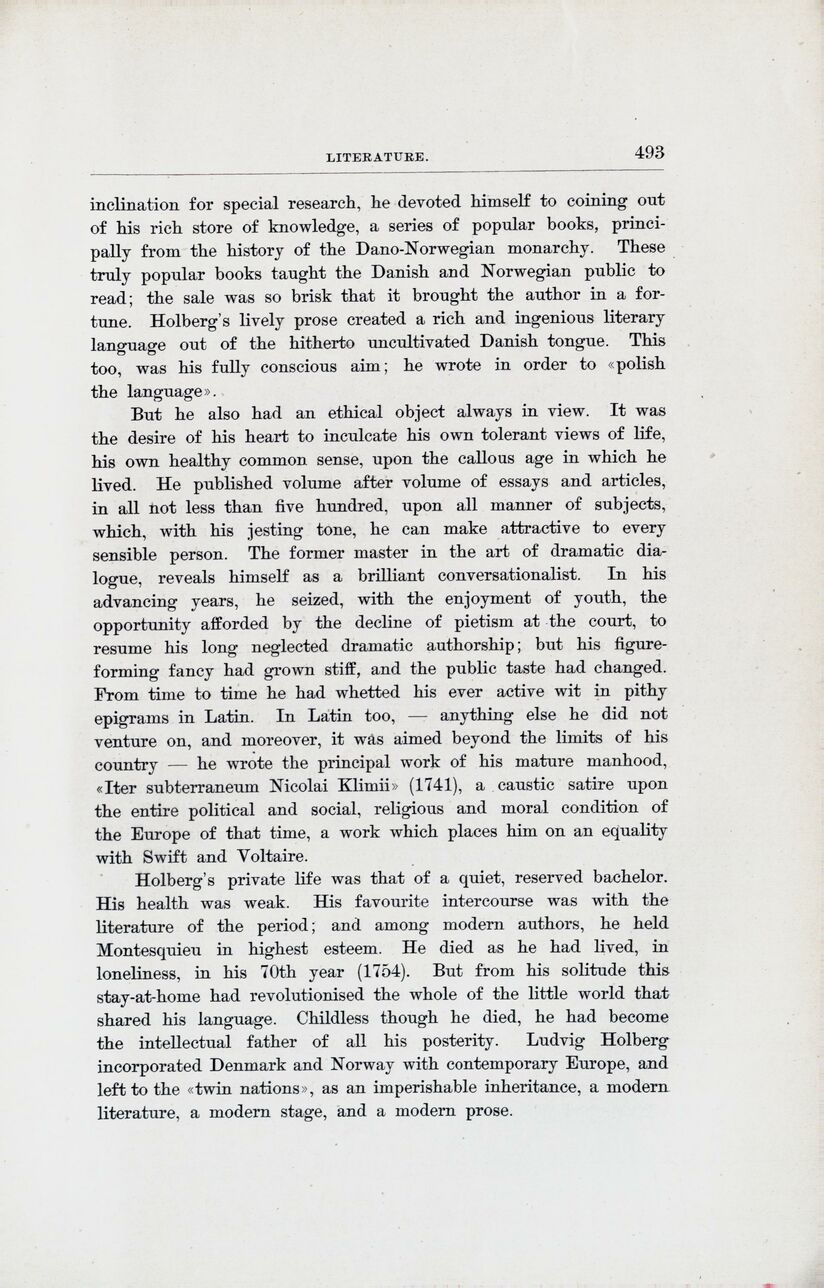
Full resolution (JPEG) - On this page / på denna sida - Literature, by Chr. Brinchmann

<< prev. page << föreg. sida << >> nästa sida >> next page >>
Below is the raw OCR text
from the above scanned image.
Do you see an error? Proofread the page now!
Här nedan syns maskintolkade texten från faksimilbilden ovan.
Ser du något fel? Korrekturläs sidan nu!
This page has been proofread at least once.
(diff)
(history)
Denna sida har korrekturlästs minst en gång.
(skillnad)
(historik)
inclination for special research, he devoted himself to coining out
of his rich store of knowledge, a series of popular books,
principally from the history of the Dano-Norwegian monarchy. These
truly popular books taught the Danish and Norwegian public to
read; the sale was so brisk that it brought the author in a
fortune. Holberg’s lively prose created a rich and ingenious literary
language out of the hitherto uncultivated Danish tongue. This
too, was his fully conscious aim; he wrote in order to «polish
the language».
But he also had an ethical object always in view. It was
the desire of his heart to inculcate his own tolerant views of life,
his own healthy common sense, upon the callous age in which he
lived. He published volume after volume of essays and articles,
in all not less than five hundred, upon all manner of subjects,
which, with his jesting tone, he can make attractive to every
sensible person. The former master in the art of dramatic
dialogue, reveals himself as a brilliant conversationalist. In his
advancing years, he seized, with the enjoyment of youth, the
opportunity afforded by the decline of pietism at the court, to
resume his long neglected dramatic authorship; but his
figure-forming [[** sjk]] fancy had grown stiff, and the public taste had changed.
From time to time he had whetted his ever active wit in pithy
epigrams in Latin. In Latin too, — anything else he did not
venture on, and moreover, it was aimed beyond the limits of his
country — he wrote the principal work of his mature manhood,
«Iter subterraneum Nicolai Klimii» (1741), a caustic satire upon
the entire political and social, religious and moral condition of
the Europe of that time, a work which places him on an equality
with Swift and Voltaire.
Holberg’s private life was that of a quiet, reserved bachelor.
His health was weak. His favourite intercourse was with the
literature of the period; and among modern authors, he held
Montesquieu in highest esteem. He died as he had lived, in
loneliness, in his 70th year (1754). But from his solitude this
stay-at-home had revolutionised the whole of the little world that
shared his language. Childless though he died, he had become
the intellectual father of all his posterity. Ludvig Holberg
incorporated Denmark and Norway with contemporary Europe, and
left to the «twin nations», as an imperishable inheritance, a modern
literature, a modern stage, and a modern prose.
<< prev. page << föreg. sida << >> nästa sida >> next page >>